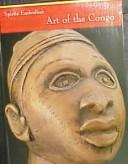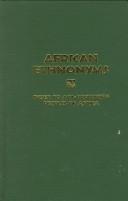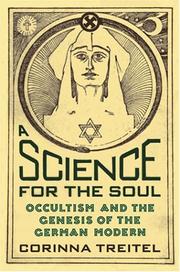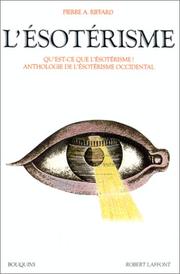| Listing 1 - 10 of 62 | << page >> |
Sort by
|

ISBN: 0816636559 Year: 1999 Publisher: Minnesota Minneapolis Institute of Arts
Abstract | Keywords | Export | Availability | Bookmark
 Loading...
Loading...Choose an application
- Reference Manager
- EndNote
- RefWorks (Direct export to RefWorks)
Art --- Art, Black --- Private collections

ISBN: 0783815328 Year: 1996 Publisher: New York (N.Y.) : Hall,
Abstract | Keywords | Export | Availability | Bookmark
 Loading...
Loading...Choose an application
- Reference Manager
- EndNote
- RefWorks (Direct export to RefWorks)
Art, African --- Names, Ethnological --- Art africain --- Noms ethniques --- Dictionaries --- Dictionnaires --- Art, Black --- Dictionaries.

ISBN: 0801878128 9780801878121 Year: 2004 Publisher: Baltimore (Md) Johns Hopkins University Press
Abstract | Keywords | Export | Availability | Bookmark
 Loading...
Loading...Choose an application
- Reference Manager
- EndNote
- RefWorks (Direct export to RefWorks)
Occultism --- History. --- Art, Black (Magic) --- Arts, Black (Magic) --- Black art (Magic) --- Black arts (Magic) --- Occult, The --- Occult sciences --- Supernatural --- New Age movement --- Parapsychology --- History
Book
ISBN: 1009067133 9781009067133 9781316512401 9781009065870 1316512401 1009079808 1009065874 1009079603 Year: 2022 Publisher: Cambridge : Cambridge University Press,
Abstract | Keywords | Export | Availability | Bookmark
 Loading...
Loading...Choose an application
- Reference Manager
- EndNote
- RefWorks (Direct export to RefWorks)
Belief in magic was, until relatively recent times, widespread in Britain; yet the impact of such belief on determinative political events has frequently been overlooked. In his wide-ranging new book, Francis Young explores the role of occult traditions in the history of the island of Great Britain: Merlin's realm. He argues that while the great magus and artificer invented by Geoffrey of Monmouth was a powerful model for a succession of actual royal magical advisers (including Roger Bacon and John Dee), monarchs nevertheless often lived in fear of hostile sorcery while at other times they even attempted magic themselves. Successive governments were simultaneously fascinated by astrology and alchemy, yet also deeply wary of the possibility of treasonous spellcraft. Whether deployed in warfare, rebellion or propaganda, occult traditions were of central importance to British history and, as the author reveals, these dark arts of magic and politics remain entangled to this day.
Occultism --- Art, Black (Magic) --- Arts, Black (Magic) --- Black art (Magic) --- Black arts (Magic) --- Occult, The --- Occult sciences --- Supernatural --- New Age movement --- Parapsychology --- Political aspects --- History.
Book
ISSN: 1570078X ISBN: 9789004203518 9004203516 9789004215269 9004215263 1283161567 9781283161565 9786613161567 661316156X Year: 2011 Volume: 15 Publisher: Leiden ; Boston : Brill,
Abstract | Keywords | Export | Availability | Bookmark
 Loading...
Loading...Choose an application
- Reference Manager
- EndNote
- RefWorks (Direct export to RefWorks)
This volume brings together thirteen studies by as many experts in the study of one or more ancient or medieval magical traditions, from ancient Mesopotamia and Pharaonic and Greco-Roman Egypt to the Greek world, Judaism, Christianity and Islam. It lays special emphasis on the recurrence of similar phenomena in magical texts as far apart as the Akkadian cuneiform tablets and an Arabic manuscript bought in Egypt in the late-twentieth century. Such similarities demonstrate to what extent many different cultures share a “magical logic” which is strikingly identical, and in particular they show the recurrence of certain phenomena when magical practices are transmitted in written form and often preserve, adopt and adapt much older textual units.
Magic --- History --- Magick --- Necromancy --- Sorcery --- Spells --- Occultism --- Art, Black (Magic) --- Arts, Black (Magic) --- Black art (Magic) --- Black arts (Magic) --- Occult, The --- Occult sciences --- Supernatural --- New Age movement --- Parapsychology --- Magic - History - Congresses

ISBN: 2221054644 9782221054642 Year: 1990 Publisher: Paris: Laffont,
Abstract | Keywords | Export | Availability | Bookmark
 Loading...
Loading...Choose an application
- Reference Manager
- EndNote
- RefWorks (Direct export to RefWorks)
Esoteric sciences --- Occultism --- #gsdb3 --- Art, Black (Magic) --- Arts, Black (Magic) --- Black art (Magic) --- Black arts (Magic) --- Occult, The --- Occult sciences --- Religions --- Supernatural --- New Age movement --- Parapsychology --- Occultisme --- Occultism. --- ésotérisme --- ésotérisme occidental --- chronologie de l'ésotérisme occidental
Book
ISBN: 9789004216372 9004216375 1283160935 9781283160933 6613160938 9786613160935 9789004191143 9004191143 Year: 2010 Publisher: Leiden ; Boston : Brill,
Abstract | Keywords | Export | Availability | Bookmark
 Loading...
Loading...Choose an application
- Reference Manager
- EndNote
- RefWorks (Direct export to RefWorks)
The question of constructing tradition, concepts of origin, and memory as well as techniques and practices of knowledge transmission, are central for cultures in general. In esotericism, however, such questions and techniques play an outstanding role and are widely reflected upon, in its literature. Esoteric paradigms not only understand themselves in elaborated mytho-poetical narratives as bearers of “older”, “hidden”, “higher” knowledge. They also claim their knowledge to be of a particular origin. And they claim this knowledge has been transmitted by particular (esoteric) means, media and groups. Consequently, esotericism not only involves the construction of its own tradition; it can even be understood as a specific form of tradition and transmission. The various studies of the present voume, which contains the papers of a conference held in Tübingen in July 2007, provide an overview of the most important concepts and ways of constructing tradition in esotericism.
Occultism. --- Tradition (Theology) --- Tradition (Philosophy) --- Occultisme --- Tradition (Théologie) --- Tradition --- Traditionalism (Philosophy) --- Philosophy --- Authority --- Art, Black (Magic) --- Arts, Black (Magic) --- Black art (Magic) --- Black arts (Magic) --- Occult, The --- Occult sciences --- Occultism --- Supernatural --- New Age movement --- Parapsychology --- Religious aspects --- Christianity
Book
ISBN: 0773586962 9780773586963 9780773586970 0773586970 9780773539983 0773539980 Year: 2012 Publisher: Montreal ; Ithaca : McGill-Queen's University Press,
Abstract | Keywords | Export | Availability | Bookmark
 Loading...
Loading...Choose an application
- Reference Manager
- EndNote
- RefWorks (Direct export to RefWorks)
Vanguard of the New Age unearths a largely ignored dimension of Canadian religious history. Gillian McCann tells the story of a diverse group of occultists, temperance leaguers, and suffragettes who attempted to build a Utopian society based on spiritual principles. Members of the Toronto Theosophical Society were among the first in Canada to apply Eastern philosophy to the social justice issues of the period - from poverty and religious division to the changing role of women in society. Among the most radical and culturally creative movements of their time, the Theosophists called for a new social order based on principles of cooperation and creativity. Intrigued by this compelling vision of a new age, luminaries such as members of the Group of Seven, feminist Flora MacDonald Denison, Emily Stowe, and anarchist Emma Goldman were drawn to the society. Meticulously researched and compellingly written, this careful reconstruction preserves Theosophist founder Albert Smythe's dream of a culturally distinct, egalitarian, and religiously pluralist nation.
Theosophy --- Occultism --- Art, Black (Magic) --- Arts, Black (Magic) --- Black art (Magic) --- Black arts (Magic) --- Occult, The --- Occult sciences --- Supernatural --- New Age movement --- Parapsychology --- Cosmology --- Religions --- Anthroposophy --- History. --- Toronto Theosophical Society
Book
ISBN: 0813050456 0813055024 9780813055022 1322181969 9781322181967 9780813050454 9780813049700 0813049709 Year: 2014 Publisher: Gainesville, Florida : University Press of Florida,
Abstract | Keywords | Export | Availability | Bookmark
 Loading...
Loading...Choose an application
- Reference Manager
- EndNote
- RefWorks (Direct export to RefWorks)
"From a plantation in Havana Province in the 1880s to a religious center in Spanish Harlem in the 1960s, this book profiles four generations of women from one Afro-Cuban religious family. The women were connected by their prominent roles as leaders in the religions they practiced and the dramatic ritual artwork they created. Each was a medium in Espiritismo--communicating with dead ancestors for guidance or insight--and also a santera, or priest of Santería, who could engage the oricha pantheon. Kristine Juncker argues that by creating art for more than one religion these women shatter the popular assumption that Afro-Caribbean religions are exclusive organizations. The portraiture, sculptures, and photographs in Afro-Cuban Religious Arts offer rare and remarkable glimpses into the rituals and iconography of Espiritismo and Santería. Santería altars are closely guarded, limited to initiates, and typically destroyed upon the death of the santera while Espiritismo artifacts are rarely considered valuable enough to pass on. The unique and protean cultural legacy detailed here reveals how ritual art became popular imagery, sparked a wider dialogue about culture inheritance, attracted new practitioners, and enabled Afro-Cuban religious expression to explode internationally."--Publisher's website.
Santeria. --- Espiritismo (Cult) --- Spiritualism in art. --- Folk art, Black --- Black folk art --- Afro-Caribbean cults --- Spiritualism --- Lucumí (Religion) --- Lukumi (Religion) --- Ocha (Religion) --- Regla de Ocha --- Regla Lucumi --- Regla Lukumi --- Santeria (Cult) --- Santeria (Cultus) --- Cults --- Espiritismo.
Multi
ISBN: 1282401998 9786612401992 9048510597 9789048510597 9789056295721 9056295721 9781282401990 6612401990 Year: 2009 Publisher: Amsterdam : Amsterdam University Press,
Abstract | Keywords | Export | Availability | Bookmark
 Loading...
Loading...Choose an application
- Reference Manager
- EndNote
- RefWorks (Direct export to RefWorks)
Between 1999 and 2009, the chair for History of Hermetic Philosophy and Related Currents at the University of Amsterdam succeeded in establishing itself as the most important centre for study and teaching in this domain, and strongly contributed to the establishment of Western esotericism as a recognised academic field of research. This volume was published at the occasion of the 10th anniversary. It contains a history of the creation and development of the chair, followed by articles on aspects of Western esotericism by the previous and current staff members, contributions by students and Ph.D. students about the study program, and reflections by international top specialists about the field of research and its academic development.
Hermetism. --- Hermeticism --- Occultism --- Universiteit van Amsterdam. --- GHF --- Occultism. --- Art, Black (Magic) --- Arts, Black (Magic) --- Black art (Magic) --- Black arts (Magic) --- Occult, The --- Occult sciences --- Supernatural --- New Age movement --- Parapsychology --- Esoteric sciences --- Western world
| Listing 1 - 10 of 62 | << page >> |
Sort by
|

 Search
Search Feedback
Feedback About UniCat
About UniCat  Help
Help News
News